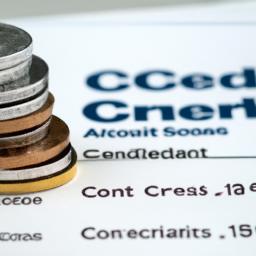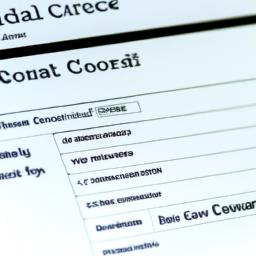Do I Need Good Credit to Open a Bank Account?

When it comes to managing our finances, having a bank account is crucial. It provides a safe haven for our hard-earned money, allows us to easily make transactions, and offers a range of financial services. But here’s a question that often arises: do i need good credit to open a bank account?
Importance of Bank Accounts in Financial Management

Before we delve into the connection between credit and opening a bank account, let’s first understand the importance of having a bank account. A bank account serves as a central hub for our financial activities. It allows us to deposit our income, pay bills, make purchases, and even save for the future. With a bank account, we can achieve better financial organization, track our spending habits, and set financial goals.
Significance of Good Credit in Various Financial Transactions

Now, let’s shift our focus to the role of good credit in financial transactions. Credit is a measure of our financial trustworthiness. Lenders, landlords, insurance companies, and even employers often use credit scores to assess our reliability in handling financial obligations. Having good credit demonstrates responsible financial behavior, making it easier to secure loans, rent an apartment, obtain insurance, and sometimes even land a job.
But does the same requirement apply to opening a bank account? Let’s explore this further in the following sections.
Understanding Bank Account Basics

Definition and Types of Bank Accounts
Before we dive deeper into the credit aspect, let’s familiarize ourselves with the basic concepts of bank accounts. A bank account is a financial arrangement between an individual and a bank, where funds can be deposited, withdrawn, and managed. There are various types of bank accounts available, such as savings accounts, checking accounts, money market accounts, and certificates of deposit (CDs). Each account type serves different purposes and offers distinct features tailored to meet specific financial needs.
Benefits of Having a Bank Account
Having a bank account offers numerous advantages that go beyond just a place to store money. Firstly, it provides a safe and secure way to keep your funds, safeguarding them against theft or loss. Secondly, a bank account allows you to conveniently make transactions, whether it’s paying bills, transferring money to others, or making online purchases. Additionally, many banks offer interest on certain account types, helping your money grow over time. Moreover, having a bank account provides a paper trail of your financial transactions, assisting in budgeting and financial planning.
Factors to Consider When Opening a Bank Account
When considering opening a bank account, there are a few factors worth considering. Firstly, assess your banking needs and determine which type of account aligns with your requirements. Are you looking for easy access to your funds or planning to save for the long term? Next, consider the fees associated with the account, such as monthly maintenance fees or ATM fees, and compare them across different banks. Additionally, evaluate the bank’s reputation, customer service, and online banking capabilities. Lastly, ensure that the bank is federally insured, providing protection for your deposits up to a certain amount in case of bank failure.
By understanding these bank account basics and considering the factors that matter to you, you can make an informed decision when opening a bank account, regardless of your credit situation.
Exploring Credit Scores and Their Relevance
Definition and Significance of Credit Scores
Credit scores play a vital role in our financial lives. They are numerical representations of our creditworthiness based on our past financial behavior. A credit score is a three-digit number that ranges from 300 to 850, with a higher score indicating better creditworthiness. It reflects how responsible we have been in managing credit, including loans, credit cards, and other financial obligations.
The significance of credit scores cannot be overstated. Lenders and financial institutions use them to assess the risk of lending money to individuals. A good credit score not only increases the likelihood of loan approval but also enables us to secure better interest rates and loan terms. On the other hand, a poor credit score may lead to loan rejections or higher interest rates, making it more challenging to achieve our financial goals.
Factors Affecting Credit Scores
Several factors influence our credit scores. Payment history holds significant weight, accounting for about 35% of the overall score. It reflects whether we have made timely payments on previous debts. Another crucial factor is credit utilization, which makes up about 30% of the score. It measures the amount of credit we use compared to our total available credit.
Other factors that impact credit scores include the length of credit history, types of credit accounts, and recent credit inquiries. It’s worth noting that negative information, such as missed payments or bankruptcy, can have a detrimental effect on credit scores.
Importance of Credit Scores in Financial Transactions
Credit scores extend beyond loan applications. They also influence various financial transactions. When we apply for a credit card, mortgage, or car loan, lenders consider our credit scores to determine our creditworthiness. Landlords often check credit scores when considering rental applications to assess the likelihood of timely rent payments. Even insurance companies may utilize credit scores to evaluate the risk associated with providing coverage.
In summary, credit scores have a significant impact on our financial transactions. They serve as a measure of our financial responsibility and affect our ability to secure loans, obtain favorable interest rates, and even secure rental agreements or insurance coverage. Understanding credit scores is crucial when considering the role they play in opening a bank account, which we will explore in the following section.
Relationship Between Credit Scores and Opening Bank Accounts
Common Requirements for Opening a Bank Account
When it comes to opening a bank account, there are certain requirements that banks typically ask for. These requirements can vary from one bank to another, but some common documents and information you may be asked to provide include:
- Personal identification: Banks usually require a valid government-issued ID, such as a driver’s license or passport, to verify your identity.
- Proof of address: You may need to show proof of your current address, such as a utility bill or rental agreement.
- Social Security Number (SSN) or Individual Taxpayer Identification Number (ITIN): This is often required to comply with regulatory guidelines and prevent fraudulent activities.
Role of Credit Scores in the Account Opening Process
Now, let’s address the role of credit scores when opening a bank account. In general, most banks do not check credit scores when you open a basic checking or savings account. These types of accounts are designed for everyday banking needs and do not involve credit-based services like loans or credit cards.
However, some banks may conduct a routine check on your banking history to determine if you have any outstanding debts or a history of fraudulent activities. This is done to protect the bank and its customers from potential risks.
How Credit Scores May Impact Account Features and Benefits
While credit scores may not be a primary factor in opening a basic bank account, they can come into play when you’re looking to access additional account features or benefits. For instance, if you’re interested in applying for a credit card, overdraft protection, or a personal loan from the same bank, your credit score may be considered during the application process.
Moreover, a good credit score may also qualify you for better interest rates on loans or higher credit limits on credit cards. So even though credit scores may not directly impact the opening of a bank account, they can influence the options and advantages available to you within the banking system.
In the next section, we’ll explore alternative options for individuals who have poor credit or no credit history.
Conclusion
In conclusion, while good credit is not always a prerequisite for opening a bank account, it can certainly enhance your banking experience and open doors to additional financial opportunities. Bank accounts play a vital role in managing our finances, providing a secure platform for various transactions. However, if you have poor credit or no credit history, there are still alternatives available.
Recap of the Importance of Good Credit in Opening Bank Accounts
Maintaining good credit is essential for financial well-being. It allows you to access a wider range of banking services, receive better interest rates, and enjoy various perks and benefits. While it may not be a mandatory requirement for opening a bank account, it can significantly impact the type of account you qualify for and the features it offers.
Summary of Alternatives for Individuals with Poor Credit
If you have low or no credit scores, don’t lose hope. There are alternative options available to you. Consider exploring secured bank accounts, which require a deposit as collateral but can help you establish or rebuild your credit. These accounts often come with similar features as traditional accounts, allowing you to manage your finances effectively.
Encouragement for Proactive Credit Management and Responsible Banking
Regardless of your current credit situation, it’s essential to take proactive steps to manage and improve your credit. Make timely bill payments, keep credit card balances low, and regularly monitor your credit report to identify and address any discrepancies. By practicing responsible financial habits, you can gradually build a positive credit history and increase your chances of qualifying for better banking options in the future.
Remember, your financial journey is unique, and while good credit can make it easier, it should not deter you from accessing essential banking services. At Kizi5.top, we believe in providing inclusive financial solutions to individuals from all walks of life. Regardless of your credit score, we are here to assist you in achieving your financial goals. Start your banking journey with us today and take control of your financial future.
Conclusion: So above is the Do I Need Good Credit to Open a Bank Account? article. Hopefully with this article you can help you in life, always follow and read our good articles on the website: kizi5.top

